Why i want a wife judy brady analysis – Judy Brady’s seminal essay “Why I Want a Wife” is a powerful and provocative critique of traditional gender roles and the unequal distribution of labor in the home. Written in 1971, the essay sparked a national conversation about the role of women in society and the importance of feminist discourse.
Brady’s essay uses humor and satire to highlight the absurdity of the traditional division of labor, in which women are expected to bear the brunt of domestic and emotional labor while men are free to pursue their careers and personal interests.
Judy Brady’s “Why I Want a Wife”: Why I Want A Wife Judy Brady Analysis

Judy Brady’s “Why I Want a Wife” is a groundbreaking essay that humorously and satirically critiques the traditional roles of men and women in society. Published in 1971, it sparked a national debate about gender equality and remains a powerful and influential work in the feminist movement.
The Role of Women in Society
Brady’s essay challenges the idea that women are naturally suited to domestic and caregiving roles. She argues that the division of labor in the home is inherently unequal, with women being responsible for the majority of unpaid labor, such as cooking, cleaning, and childcare.
This unequal distribution of labor perpetuates gender stereotypes and limits women’s opportunities outside the home.
Personal and Domestic Labor
Brady highlights the emotional and psychological toll that unpaid labor takes on women. She argues that women’s constant responsibilities for domestic work can lead to feelings of isolation, resentment, and burnout. By raising awareness of the value of domestic work, Brady’s essay has helped to challenge the idea that it is a “natural” or “feminine” duty.
Emotional and Sexual Intimacy
Brady also critiques the lack of emotional and sexual fulfillment in traditional marriages. She argues that women are often expected to be both the emotional and sexual caretakers of their husbands, while men are not held to the same standards.
This imbalance can lead to resentment and dissatisfaction in relationships. Brady’s essay challenges societal expectations of women’s sexual roles and advocates for open communication and shared responsibility in relationships.
Legacy and Impact, Why i want a wife judy brady analysis
Judy Brady’s “Why I Want a Wife” has had a profound impact on feminist discourse and continues to resonate with readers today. The essay’s humor and satire make it an accessible and engaging read, while its insightful critique of gender roles has helped to shape contemporary conversations about gender equality.
The essay remains a powerful reminder of the challenges faced by women in society and the need for continued progress towards gender equality.
Key Questions Answered
What is the main argument of Brady’s essay?
Brady argues that traditional gender roles are unfair and oppressive to women. She highlights the unequal distribution of labor in the home, the lack of emotional and sexual fulfillment in traditional marriages, and the societal expectations that limit women’s opportunities and choices.
How does Brady use humor and satire in her essay?
Brady uses humor and satire to make her points more effectively. She creates a persona of a woman who is desperate to find a wife to do all the housework, childcare, and emotional labor that she is tired of doing herself.
This persona allows Brady to highlight the absurdity of the traditional division of labor and the societal expectations that women should be responsible for all aspects of domestic life.
What is the legacy of Brady’s essay?
Brady’s essay has had a lasting impact on feminist discourse. It has been widely anthologized and taught in women’s studies and gender studies courses. The essay has also been credited with helping to raise awareness of the value of domestic work and the importance of challenging traditional gender roles.

